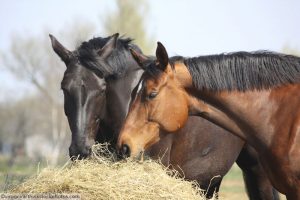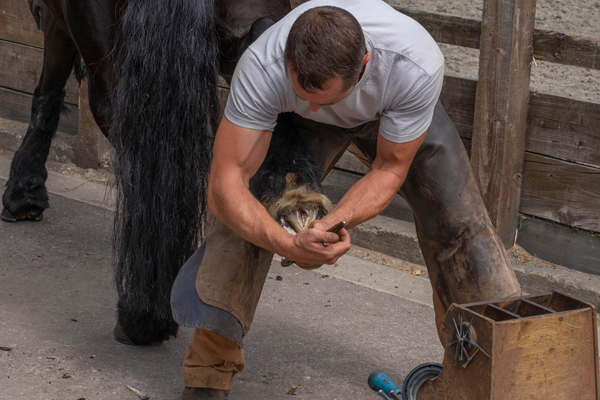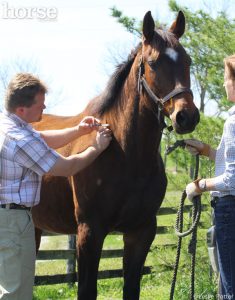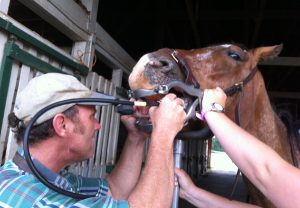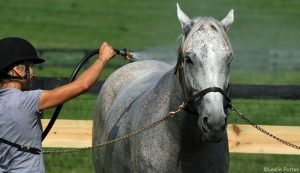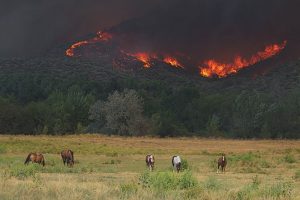Congratulations on your newly adopted horse! Whether you are new to horses or not, this is an exciting time, although it can be overwhelming if you haven’t owned a horse yet or if it has been a while. We’ve put together some articles in a variety of areas to help get you started as a new horse owner. We hope these articles give you a good foundation on your horse ownership journey.
In addition, we’ve got even more content—thousands of articles—in our print magazine and on this site. After you check out the articles below, feel free to browse by category or search using our search tool.
You can also sign up for our weekly enewsletter at www.horseillustrated.com/newsletter.
Happy reading & riding!
Getting Started
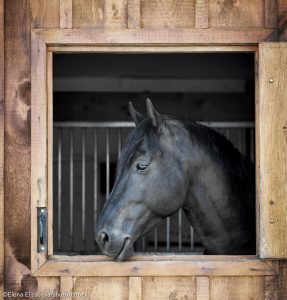 What You Need for Your New Horse: You’ve chosen your new equine partner, but don’t forget to consider the following before you bring him home: where he will live, what will you feed him, how will you introduce him to any herd mates, and how you will choose a veterinarian and farrier. And then comes the shopping trip for the necessities for a grooming box and first-aid kit.
What You Need for Your New Horse: You’ve chosen your new equine partner, but don’t forget to consider the following before you bring him home: where he will live, what will you feed him, how will you introduce him to any herd mates, and how you will choose a veterinarian and farrier. And then comes the shopping trip for the necessities for a grooming box and first-aid kit.- What is the Cost of Owning a Horse?: How much can you expect to spend on horsekeeping? Calculating costs can be complicated. While some expenses, such as basic veterinary and farrier fees, are relatively consistent over time, while others vary from region to region and year to year, such as feed and hay. Let these tips from Horse Illustrated help you get started on making your horsey budget.
- Horse Cost Calculator: This horse expense calculator will help you add up the estimated or quoted costs you may have for your new horse. Use this to determine how much you need to budget for your new steed every month and every year.
Basic Horse Health
- 10 Horse Health Hacks: Of course your horse’s health is important to you. But it’s easy to get confused and even overwhelmed with all of the vaccines, health papers and deworming schedules you have to keep track of. Here are 10 tips to make caring for your horse’s health simple, organized and streamlined.
Feeding Your New Horse
Feeding Guide for Your Horse: Getting your horse’s diet right is one of the most important parts of horse care. What he eats affects his health and how well he performs under saddle. First, decide which of three categories your horse falls in: overweight, underweight, or just right. Then check out these tips for feeding your horse or pony right.
- Why Every Horse Needs Turnout Time: Allowing a horse to live turned out with other horses for all or most of the day is best for your horse’s physical and mental health and well-being. However, there are legitimate concerns about safety risks that come with being turned out in a herd. Horse owners and farm managers can implement management techniques that reduce the risks while providing plenty of turnout.
- Hay Buyer’s Guide: Most horses don’t live on pasture alone. Hay, or another type of forage, may need to be supplemented, especially during times when pasture can’t provide all of the horse’s nutritional needs. Here’s what to look for when hay shopping, where to find it, how to move it, and how to store it.
- Find the Right Horse Feed: And then there is grain, concentrated feeds, and more. When you wander through a feed store, there are many brands of equine feed, and each one has many specialized feed formulations. But what does your horse need? Here’s how to read the feed tags and zero in on what matters most.
- Four-Season Horse Feeding Guide: As the seasons come and go, your horse’s nutritional needs will change, requiring some adjustments to his diet. Read on for season-by-season advice, followed by a handy checklist.
- Nutrition: Equine nutrition is a complex topic. Horse Illustrated and Young Rider have published an abundance of articles on the topic. Dive into more so you can better understand equine nutrition.
Hoof Care
Choosing a Farrier and Establishing a Relationship: What are some of the most important things to look for when seeking a hoof-care professional for your horse? What are some things you can do to ensure a successful relationship? Let’s take a look at some ideas, and before long, your properly trimmed or well-shod horse will be sure to thank you!
- Hoof Care for Horses: What every horse owner needs to know about hoof health care, including finding the right farrier, scheduling appointments, hoof health from the inside out, topical hoof treatments, whether to keep your horse shod or barefoot, and more.
- Patient Hoof Picking: Picking out the hoof is crucial for your horse’s care and hoof health. But it’s sometimes more complicated than just lifting his foot up. Learn from a top trainer how to get compliance from your horse.
- Solve Hoof Health Problems: Be prepared in case your horse develops any kind of hoof problem. Know what to look out for and how various problems are treated or managed.
Vaccinations
Core Equine Vaccines: These core vaccines protect against five serious diseases—here’s why your horse should never miss them.
- Common Horse Diseases and Vaccination Guidelines: The American Association of Equine Practitioners provides recommendations for owners on vaccinations to prevent the most common diseases in horses.
- Vaccination Fact and Fiction: Myths and misconceptions still abound in regards to vaccinations. As a new horse owner, learn more truth vs. fiction about core vs. risk-based vaccines, evaluating risk, your horse’s immune system, differences for older and younger horses, why you should worry about rabies, timing of vaccinations, DIY vs. veterinarian-given, and possible side effects.
Deworming
- Regional Parasite Control for Horses: Horses that graze need to be dewormed differently from those who don’t. Learn how to keep your horse healthy and parasite-free with a deworming plan suited to your regional climate and individual horse.
- 8 Equine Deworming Myths: Ideas about deworming practices are constantly changing as research improves. Yet even with all of the available educational materials, some horse owners tend to be creatures of habit, following old routines instead of adapting to updated recommendations. This could negatively impact horse health. To explore and debunk some widespread deworming myths and get the most current advice, we consulted with experts from major pharmaceutical and horse care companies.
Dental Care
Equine Dentistry Today: Equine vets have stepped up the dentistry game big time. Now the industry has a board certification association that creates actual equine dentists, which is a great deal different than a dental school that certifies non-vets. Learn more about your horse’s mouth, how the tooth works, about various dental issues, and about the importance of the dental exam.
- Equine Dental Health Basics: Points, hooks, waves and ramps … they may not sound connected, but all four are common abnormalities that equine dentists regularly address in their four-legged patients.
Grooming and Bathing
5 Tips for Bathing Your Horse: Whether it’s a quick spritz to get off grime and sweat or a super-soaker for a deep clean, here are five tips to get the most out of your horse’s bath.
- Groom Your Horse Like a Pro: Grooming provides benefits beyond cleaning your horse, including increasing blood flow to muscles and skin, and building a bond with your horse. Learn more about why grooming matters, what grooming tools to have on hand, how to develop a routine, care of brushes, and more tips from two industry professionals.
- Mane and Tail Care: There’s something undeniably appealing about a horse with a full, shiny mane and tail. But taking care of a mane and tail requires some extra work! Learn more so your horse can have some luscious locks.
- Secrets to a Shiny Coat: We’ve all done a double take when a horse goes by with a blindingly shiny coat. Whether or not you show your horse, you’d probably rather he have a shiny coat than a dull one. So what makes a coat shine? Read on to find out.
Tack and Equipment
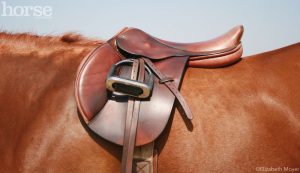 Find a Saddle That Fits Your Horse: A poor-fitting saddle can affect how you ride, your horse’s behavior, and you and your horse’s comfort level. Learn more about basic saddle fit requirements, proper saddle placement, how to check saddle fit, and signs of poor saddle fit.
Find a Saddle That Fits Your Horse: A poor-fitting saddle can affect how you ride, your horse’s behavior, and you and your horse’s comfort level. Learn more about basic saddle fit requirements, proper saddle placement, how to check saddle fit, and signs of poor saddle fit.- How to Choose a Western Bit for Your Horse: Whether you’re a seasoned rider or just starting your horsemanship journey as a new horse owner, bits are a complex science. It can seem daunting to choose the right one from the wide array of western bits available, but armed with information about the major types and their mechanics, you’ll have an idea of where to start, and which bits to leave on the rack.
- English Bit Basics: The number of bits available are almost limitless. It can be a challenge to make a quick decision and pluck just one from the rack at the tack store. First, check out this three-step guide to finding the best English bit for your horse.
- The Dirty Details on Cleaning Your Tack: One important thing for new horse owners to learn is how to clean tack, and why. It’s a cringeworthy thing to see once-beautiful tack lying in a dirty heap on the bottom of the tack room floor, piled high with dust and bits caked with dried hay and slobber. To avoid that, learn how to take care of your horse’s equipment so it lasts well into your horsey future.
Riding
A Fitness Plan for Your Horse: Conditioning is key for keeping your horse sound and fit for riding. This article discusses basic conditioning for horses, conditioning needed for trail riding, and conditioning for the horse that will spend more time in the arena than anywhere else. It also gives more information on pulse and respiration—why knowing these are important, how to take them, and why tracking these are important.
- Getting Started with Horses: Lesson Programs: If you are newer to riding or being a horse owner, or if you want to just brush up on your riding skills, then taking riding lessons can be a good idea. Look for a reputable barn with an experienced instructor. Here’s more on what to look for.
- Get the Most from Your Riding Lessons: Once you start lessons as a new horse owner, you’ll want to ensure you can get the most from those lessons.
Disaster Preparedness
Horse Emergency Planning Tips: It’s always a good reminder to have a plan and be ready in case of a natural disaster or other emergency. Wildfires, floods, and hurricanes are among the most destructive disasters. If you have to evacuate your home, it’s essential to know what options you have for your animals. We hope these horse emergency planning tips help you make your plan.
- When Disaster Strikes: The lesson horse owners learned during several major tragedies was that disaster planning is crucial. If you think it can never happen to you, think again. Planning for disasters that can happen any time, can benefit your new horse, life, and farm.
- Tips for Horse Owners to Prepare for Hurricane Season: It is important for horse owners to ready themselves in advance for evacuation and other recommended tasks related to hurricane preparedness. Here are some tips from the Louisiana State Animal Response Team (LSART) and LSU School of Veterinary Medicine for effectively preparing horse owners in areas prone to hurricane damage.
- What to Do in Case of a Barn Fire: Barn fires are indiscriminate and swift. To protect your barn and your horse, follow these disaster preparedness guidelines developed by The Humane Society of the United States (HSUS).
- Prepare Your Horse and Barn for Emergencies with Free Online Resources: The American Association of Equine Practitioners advises coastal veterinarians and horse owners to review their disaster response protocol during the height of hurricane season.
Senior Horses
- Super Senior Horse Care: Today, the average horse in the United States can expect a longer, healthier life than his ancestors. There are multiple reasons for this increased longevity, but advances in horse veterinary medicine is one reason. Read on to learn more about senior horse health care and wellness and about the most common issues your older horse might have to deal with.
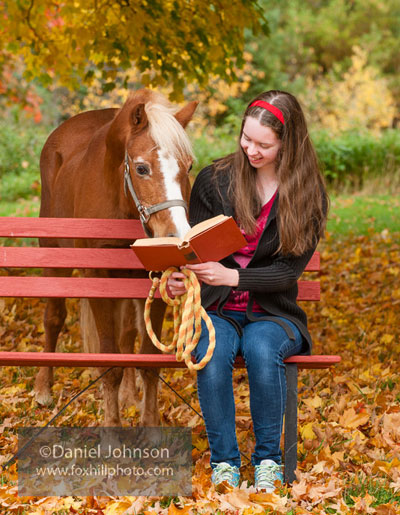
Photo by Daniel Johnson
Why Horses
- 6 Reasons Why We Love Our Horses: Sometimes people ask: why would you want to do all that work? What’s in it for you? Why are horses such a special part of your life? While the reasons may be diverse, you could say that you love horses because of the following reasons. And we’re sure you have a few of your own to add to the list, especially after some time of being a new horse owner.

